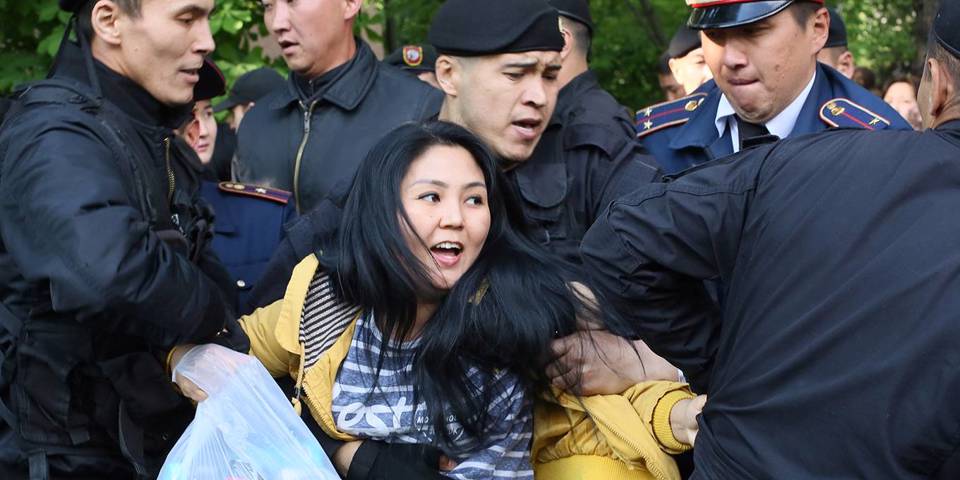
Kazakhstan’s former president, Nursultan Nazarbayev, who resigned in March after nearly 30 years in power, was a great admirer of the Singaporean leader Lee Kuan Yew.
For Nazarbayev, Lee’s leadership showed the importance of strengthening the economy before liberalizing politics. But the flaws in this approach are now on stark display.
As Nazarbayev put it, “The middle class will not emerge without a sustainable economy, which cannot exist without a sufficiently strong and wise leadership capable of getting the country out of freefall.” But a sustainable economy is not what his government built. Instead, it relied on oil revenues – which comprised over 27% of the country’s overall budget in 2014 – to keep taxes low, effectively buying citizens’ acquiescence to authoritarianism.
When global oil prices plummeted in 2014, from over $100 per barrel to about $50, Kazakhstan was hit hard. The local currency, the tenge, lost nearly half its value against the US dollar, real incomes dropped to pre-oil boom levels, and unemployment skyrocketed, especially among the young.
But the problem extends far beyond economics. Amid surging inequality, frustration with pervasive corruption has intensified. In 2018, Kazakhstan ranked 124th out of 180 countries in Transparency International’s Corruption Perceptions Index. Meanwhile, the state is failing to provide basic security: in July 2018, an Olympic ice-skating medalist, Denis Ten, was murdered in broad daylight in the center of Kazakhstan’s largest city, Almaty, for trying to prevent his car mirrors from being stolen.
All of this has made emigration an increasingly appealing option, especially for young people, raising the specter of a “brain drain.” It has also turned up the heat on simmering social unrest, which has boiled over since Nazarbayev’s resignation (which may well have been intended specifically to preempt popular protests).
Nazarbayev claims that he wants to help a “new generation of leaders,” and his resignation did, for a brief moment, given Kazakh citizens hope that change was coming. But Nazarbayev installed a loyal successor, Kassym-Jomart Tokayev, who used his first presidential decree to name the capital city after Nazarbayev and then called a snap election that, like those held by his mentor and patron, was rigged. According to the Organization for Security and Cooperation in Europe, the June 9 election “was tarnished by clear violations of fundamental freedoms, as well as pressure on critical voices.” When hundreds of people took to the streets of two major cities to protest the vote, about 500 were detained.
Nazarbayev also retained sweeping powers: not only is he lifelong chairman of the influential Security Council; he has also devised a new title for himself – the so-called Elbasy, or “leader of the nation” – that grants him immunity from any prosecution. Last month, on Nazarbayev’s 79th birthday – a national holiday tied to the renaming of the capital from Astana to Nur-Sultan – protesters again held rallies, this time demanding that he cede all power. Dozens were arrested.
More than 4,000 people have been detained in all the protests during and since the election, according to Erlan Turgumbayev, the minister of internal affairs. The United Nations Human Rights Office for Central Asia has called the crackdown on peaceful protesters, activists, and journalists during and after the presidential election “extremely regrettable.” Given Tokayev’s former position as UN deputy secretary-general, this condemnation should sting.
In any case, Kazakhs are not done fighting, and grassroots movements – organized through social media and financed through crowdfunding – are leading the way. One such movement – called Oyan, Qazaqstan (Wake up, Kazakhstan) – emerged just before the June election. After making clear that it is not a political party trying to secure power, it introduced a nine-part program focused on reforming the electoral system, shifting to parliamentary rule, preventing political repression and protecting human rights.
Meanwhile, ongoing political instability and resulting capital flight, even more than economic factors, is driving down the value of the tenge, which last month reached its lowest point since 2016. This highlights a reality that Tokayev has recognized rhetorically, but still has to prove with real political reforms: contrary to the logic of Nazarbayev and Lee, economics do not always take precedence over politics.
This does not mean that there are no economic solutions to Kazakhstan’s struggles. In my view, three economic reforms should urgently be pursued to help address inequality and unemployment in the short term.
First, the tax system needs to be overhauled to encourage the development of micro- and small businesses that can help to create jobs. Second, in order to stimulate the growth of underdeveloped medium-size firms, the government should grant them preferential treatment in public procurement. And, third, tax revenues should be decentralized, with local authorities keeping more of the corporate taxes that they collect, thereby increasing their accountability to local business.
Nonetheless, appeasing Kazakhstan’s people – and thus stabilizing its politics – must take priority. That means, first and foremost, credible and concerted action to root out corruption and strengthen the rule of law. As a banner unfurled during a marathon in Almaty (which earned its creators 15 days in jail) declared, the still-powerful Nazarbayev and his protégé, Tokayev, “cannot run from the truth.”
Original source: Project Syndicate




